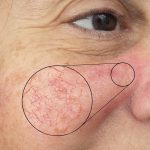Your skin is the largest organ in your body. It is a protective barrier against germs and elements from the environment. It is normal to have skin issues occasionally, but when a condition is persistent or unusual, you may wonder when to see a dermatologist.
Making a dermatology appointment when you notice a change in your skin could be lifesaving. What may at first seem like a harmless mole, blemish or rash could develop into something much worse. One in five Americans will develop skin cancer in their lifetime, so it is not an appointment that should be postponed.
Watch for these signs that it’s time to start seeing a dermatologist:
You notice a mole or patch of skin that has changed
Whether it is a mole you have had your entire life or one that just appeared, it is important to see a dermatologist if you notice any changes in moles or spots. Any mole or spot on your skin that has changed color, size or shape should be evaluated.
These changes could be natural skin aging or something more serious, like skin cancer, that requires treatment or removal. Always seek medical attention as soon as possible in these cases, as early detection is crucial to successful treatment.
You are experiencing stubborn acne that won’t go away
Acne is the most commonly diagnosed skin condition in America and can affect anyone. Knowing when to see a dermatologist for acne may be confusing. If you have tried over-the-counter treatments for months and your acne still bothers you, make an appointment.
A dermatologist can prescribe effective medications to treat acne. Many skin conditions resemble acne but won’t respond to acne treatments. You may be suffering from a condition similar in appearance to acne, such as rosacea. Your doctor will be able to evaluate your skin to determine the cause of the issue.
Your skin is itchy, dry and irritated
Many people consider dry skin a harmless condition you can treat at home. If your skin is persistently itchy, red, dry and flaky and isn’t responding to over-the-counter creams and lotions, it could be a chronic skin condition known as eczema.
A dermatologist can diagnose and provide insight on how to manage this condition. Possible treatments for eczema include topical ointments, light therapy and oral medications. Your dermatologist can also help you determine potential eczema triggers and help you avoid flare-ups.
You notice scaly, rough patches on your skin
Scaly, rough, sometimes itchy and red patches on your skin could be a condition known as psoriasis. It is most commonly seen on the scalp, elbows, knees and lower back. This condition can occur when skin cells grow too quickly, leaving the body unable to shed the cells fast enough. The cells accumulate and result in thick, scaly patches on the skin.
If you have seen a medical doctor about the condition, ask the question, “Do I need to go to a dermatologist?” Someone specializing in skin conditions can diagnose psoriasis and prescribe treatments to ease discomfort.
You have hives or an allergic reaction that won’t go away
If you are experiencing an allergic reaction to an unknown allergen that lasts longer than a few days, make an appointment with your dermatology clinic. Your dermatologist can perform an exam to rule out other skin conditions.
Dermal patch testing, an in-office procedure, can help your dermatologist identify the specific environmental allergens causing your rash so that you can eliminate it. Your dermatologist may also create a treatment plan to reduce symptoms and provide information on alternatives.
You have noticeable scars
Acne, skin blemishes, burns, cuts and scrapes can cause scarring, ranging in color from white to red to purple. Scars can be raised, thick or deep in the skin. If your scarring is severe or bothers you, it is time to see a dermatologist for treatment options.
A skin specialist can offer procedures and treatment to lighten scars or improve raised or depressed scars. For instance, medical-grade exfoliants, chemical peels or microdermabrasion may help with old scars.
You are experiencing hair loss
Although it is natural to lose hairs daily, excessive shedding or loss of more than 50 to 100 hairs per day, bald spots or a widening part could be cause for concern. A medical professional should evaluate it.
Hair loss can be hereditary but also result from a lack of nutrients in your diet. Hair loss is also common after pregnancy due to hormone fluctuations. A dermatologist can determine the cause of the hair loss and offer a solution or treatment, such as PRP for hair loss.
Dermatologists in Columbia
If you are experiencing any of the above issues, schedule an appointment with one of the board-certified dermatologists at Columbia Skin Clinic. We offer clinical dermatology and cosmetic treatments for a variety of issues. Contact us today to make an appointment at one of our four locations in South Carolina.






